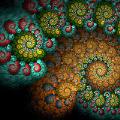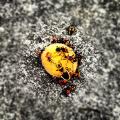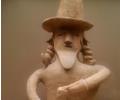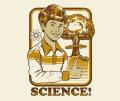
DMT-Nexus member
Posts: 583 Joined: 30-Oct-2012 Last visit: 09-Oct-2019
|
Hello Everyone,
I was unable to get the poll to work in the other thread so created this one.
I took the books suggested in the other thread and numbered them and had Kikker generate random numbers to narrow it down to the 9 above.
Please vote for the one that you would like to read and discuss, the poll will be open for 5 days.
I would also like to hear ideas on how to structure discussion of the book we choose and/or the book club as a whole.
Thank you,
adam
|
|
|
|
|

☂

Posts: 5257 Joined: 29-Jul-2009 Last visit: 23-Dec-2025 Location: 🌊
|
Thanks adam. I'm not sure why it wouldn't let us edit the post in the first thread and insert the poll but oh well. I voted for left in the dark but magicians of the god would be my second choice. They both compliment each other perfectly and they way they indirectly strengthen each others case and reshape our view of history/consciousness/psychedelics and where we came from is very interesting. We might be able to invite the authors to the discussion of their books as well.
<Ringworm>hehehe, it's all fun and games till someone loses an "I"
|
|
|

Dreamoar

Posts: 4711 Joined: 10-Sep-2009 Last visit: 16-Jan-2026 Location: Rocky mountain high
|
I was thinking 1 chapter a week is probably a good pace as should allow for everyone who wishes to participate to find the time to read the chapter and join the discussion. Exact format seems like it's going to vary a lot with subject matter. Something like Naked Lunch is going to generate a very different discussion than something like Magicians of the Gods for example. I enjoy reading fiction moar than non-fiction in general, it is my favorite drug, but I find myself moar excited about the research and discussion possibilities presented by the non-fiction entries than I am about the fiction entries. In any case I'm sooper excited to see where this goes. 
|
|
|

☂

Posts: 5257 Joined: 29-Jul-2009 Last visit: 23-Dec-2025 Location: 🌊
|
A chapter or 2 a week sounds like a good way to format it dreamer. We can always adjust if need be.
<Ringworm>hehehe, it's all fun and games till someone loses an "I"
|
|
|

Dreamoar

Posts: 4711 Joined: 10-Sep-2009 Last visit: 16-Jan-2026 Location: Rocky mountain high
|
|
|
|

DMT-Nexus member
 
Posts: 12340 Joined: 12-Nov-2008 Last visit: 02-Apr-2023 Location: pacific
|
I would rather discuss like..the Iliad or the Gita than any of those other books listed..but Naked Lunch and Moby Dick would be my top choices of those books. Long live the unwoke.
|
|
|

DMT-Nexus member
Posts: 583 Joined: 30-Oct-2012 Last visit: 09-Oct-2019
|
well jamie you should have submitted a book choice  There is always the next one.
|
|
|

DMT-Nexus member
Posts: 583 Joined: 30-Oct-2012 Last visit: 09-Oct-2019
|
Hello Nexian Book Club Members, Thank you all for wanting to participate. Left in the Dark is the winner of the poll, and the first book that the nexian book club will read and discuss. Here is a foreward by Dennis Mckenna Left in the Dark ForewardI believe this is a great book for us to read and discuss and should resonate deeply with many of the members here. You can purchase the book here , or on amazon. Although more money goes to the author when purchasing from the linked site. I would like everyone to purchase the book and have the first chapter read by December 12, and leave a post about it. Some prompts for a post may include: -What is the theme? -impressions on authors writing style -Thoughts on content -Questions you would ask the author -A particular passage you would like to discuss Thanks again, adam
|
|
|

DMT-Nexus member
Posts: 990 Joined: 13-Nov-2014 Last visit: 05-Dec-2020
|
I'd love to follow along but I don't think it will make it to OZ in time for the 12th.  Inconsistency is in my nature. The simple PHYLLODE tekI'm just waiting for these bloody plants to grow
|
|
|

DMT-Nexus member
Posts: 583 Joined: 30-Oct-2012 Last visit: 09-Oct-2019
|
You can join in at anytime, if you get the book late you could read a couple chapters and catch up, since we will be reading one chapter a week it shouldn't be to difficult to catch up with us.
|
|
|

☂

Posts: 5257 Joined: 29-Jul-2009 Last visit: 23-Dec-2025 Location: 🌊
|
I'd definitely recommend giving this a listen. It's mind blowing on its own, but it fits in very well with the current book we're reading. Link
<Ringworm>hehehe, it's all fun and games till someone loses an "I"
|
|
|

DMT-Nexus member
Posts: 583 Joined: 30-Oct-2012 Last visit: 09-Oct-2019
|
Hello,
I am hoping there are people reading along. Sorry that I've been behind on this thread, Finals have been hectic.
I started reading the book and finished chapter 1 and am part way through chapter 2. So far my thoughts on the book are mixed.
The general theory that Wright seems to be laying down is that essentially a transition from a diet rich in plants, fruit in particular, to a diet of grains and meat has led to a dominance of left hemisphere of the brain over the right. This left hemisphere dominance suppresses creativity and feelings of awe and grandeur in life. Being embedded deep in an arboreal system early humans were expanding their minds through a diet rich in fruit that created a feedback loop between ecosystem, and mind.
My issue with the book is the evidence seems a bit tenuous so far. For example he claims that a diet rich in fruit directly affects DNA transcription and this biofeedback between diet and brain chemistry affected human evolution in novel ways, but doesn't explain and mechanisms at this point in the book. So, before I judge to harshly I'll keep reading as I feel like this is major tenet of the book and that the author will explain this more.
Tony Wright also goes into detail about a sleep deprivation experiment. He essentially claims that humans don't need sleep, or at least implies we need little. He cites an experiment that to me seems to lack replication and is not well designed not to mention the inherent bias considering he was the subject of this experiment, although references it as if it was objective. The experiment is one where he performs the same task for days on end without sleep. He concludes that he got better at this task because his reflexes actually increased with lack of sleep, although he fails to realize or I failed to read something, about the fact that when you perform the same task days in a row you may become better at it with repetition despite sleep deprivation.
So far the book puts forth an interesting theory with a logical premise. However I remain skeptical of a lot of the evidence and want to look further into some of the citations he offers, I get a feeling that some of the work that supports his theory is also tenuous. Although, I remain a bit skeptical I respect the premise and do think that more research between neuroscience, diet, and expanded consciousness needs to be done.
I think as nexians this theory seems actually intuitive and likely to be true. I guess I am just being a critic because years of schooling have trained me to be one. I look forward to reading more and hope that Mr. Wright expands more on the particular biological mechanisms that underlie his theory.
|
|
|

☂

Posts: 5257 Joined: 29-Jul-2009 Last visit: 23-Dec-2025 Location: 🌊
|
Forgive me in advance for my verbose posting in this thread! This is a book that is difficult to read and interpret in separate chunks (a classic left brained task, I might add  ). The full context is obviously much harder to grasp this way and, being so inherently multi-disciplinary, context is vital to understanding how the pieces fit in this kind of theory. I always found it much easier to understand books when reading a few chapters at a time, or in just a couple sittings, but that's just me. I think people should read at their own pace. And try and keep in mind the implications regarding how we process this info if it is indeed the case that we all have this condition. The biochemical mechanisms are presented in later chapters. They are surprisingly straightforward at the core but we'll get into that later. I'll elaborate a bit on sleep dep because it's one of the most ancient/universal yet misunderstood techniques there is. To clarify, Wright isn't claiming that we don't need sleep. The point is that it seems that, once fueled by more optimal biochemistry and especially with practice (as with anything), reduction in sleep leads to the left hemisphere becoming more dysfunctional (speech slurs etc.), but along with this increased dysfunction it is inherently less capable of maintaining its normal level of hemispheric dominance, allowing more of the less accessible functions of the right hemisphere to come through into awareness. This is not an easy technique for everyone and doesn't work good for most people without a lot of preparation, and can even be dangerous without it. But it is nevertheless an extremely powerful and ancient tradition implemented around the world in some form or other, and this explains why. There is an interesting switch over point where the tiredness goes away completely and a new mode of being is experienced, but maybe more on that later. The sleep deprivation experiment/manchester trial is interesting because a task such as balancing is not something that is going to improve as you go days on end without sleep despite how, under normal conditions, you would of course improve via repetition. This is not the norm as tiredness increases, as Colin Groves has explained, and as other experimenters of sleep deprivation (lacking the biochemical elements, of course) have experienced. Things like balance and coordination usually decrease drastically the longer one goes without sleep, so for the participants level of functionality to even stay the same would be quite interesting, but for them to get much better is shocking. This experiment is more of a sidenote though than it is the core of anything or hard evidence, and barely a glimpse at what Tony and the other participant have experienced perceptually speaking. Replication of this research would be very intriguing but the resources aren't there, and most scientists don't know what to make of it to begin with because of the lack of context. Having experimented with it to a degree, these types of effects are intriguing but definitely not the most interesting bits about sleep deprivation - those are harder to study in a scientific setting. The perceptual effect is profound. I stumbled onto a psychedelic sleep dep experience accidentally before reading this book. At one point, like the author, my thoughts were completely in rhyme for a period of time. It was impossible to think in any other way and was extremely bewildering. The material I'd been studying - 15 pages of complex philosophy - was accessible in a bizarre kind of ghestalting visual memory with 100% recall. The night was filled with epiphanies of all sorts and not unlike a nice dose of mushrooms for me. It is arguably the most ancient documented technique for accessing "the gods", as described in the epic of gilgamesh: one of the most ancient texts we have... The buddha was also said to have meditated for around a week under a tree (a fig tree, no less). I've always found it odd that we neglect the fact that this is not just meditation alone, but extreme sleep deprivation. So here we have a global religion with well over 300 million followers... that all stems from an alleged sleep deprivation experience in the ancient past. A recent example of some effects of even light sleep deprivation for me two nights ago: When I finally did fall asleep after very blissful meditation, and far more of that warm pulsing activity in that center part of my head than normal, I became lucid in the dream. I knew I was dreaming but I could simultaneously feel my body laying on the couch as well, while my dream body seemed to be outdoors in the street somewhere near my house; this realization went on in nothing approaching a normal state of consciousness. I decided to stay in the dream instead of waking up, and so immersed myself within it completely and let go of the tether to my body. Everything was enhanced and processing in a more unified visual way as well. Some part of me decided to float upwards, above the town and the city. If any of you are familiar with flying in dreams, you might know how difficult it can be to hang onto that feeling of relaxed focus that allows you to maintain flight. The harder your conscious mind tries the more you fail. This time I easily let go and that feeling grew and grew like a balloon as I floated up and up. The city reminded me of a cell, or galaxy, or atom - the fractal mirroring of each expressed throughout the whole. Floating upwards above all this and through the clouds, then above the earth, eventually I dove straight into the sun and into the heart of that ballooning orgasmic feeling in me. It was extremely blissful but words don't work here. When I emerged from the white light, I was floating above the plane of the milky way galaxy in a state of mind I can't even begin to explain. Some of you probably already know I have bizarre dreams to begin with but this level of profoundness is FAR more common when engaging in these techniques, preferably in combination. Not hard evidence, no, but a glimpse of the possibilities is all. The hard evidence is in the biochemical mechanisms and the brain research analyzed in the following chapters. And self experimentation.
<Ringworm>hehehe, it's all fun and games till someone loses an "I"
|
|
|

DMT-Nexus member
Posts: 583 Joined: 30-Oct-2012 Last visit: 09-Oct-2019
|
First off I hope that more people are reading and will chime in. Despite my first relatively critical post about the book I am finding it very interesting as I read on. I suppose my critique coming off a semester of reading and reviewing scientific articles was unfair considering this is a book, and not a scientific journal entry. That being said the research Mr. Wright references seems to be legit.
I have read chapter two and am nearly done with chapter 3 and will post more on the chapters soon. In short he makes some really compelling arguments about certain details overlooked on the subject of human evolution. Namely regarding the links between heritability of cellular regulation and diet. I am looking forward to finishing chapter 3 and 4 soon and will post in more detail my thoughts on it all.
I hope some others will chime in because I think the topics addressed in this book are directly related to interesting state of consciousness. The book so far seems to be giving a window in to an evolutionary path that with our present knowledge and technology, society would benefit from further research in. Also, the line of though presented in the book reminds me that we have the power to control our own evolution as a species, with that in mind should we not understand mechanisms that act on evolution?
I think a lot of Nexians would really benefit from reading and discussing the information in this book.
|
|
|

DMT-Nexus member
Posts: 990 Joined: 13-Nov-2014 Last visit: 05-Dec-2020
|
Almost done with the silly season, will be reading when I get the chance  Inconsistency is in my nature. The simple PHYLLODE tekI'm just waiting for these bloody plants to grow
|
|
|

DMT-Nexus member
Posts: 990 Joined: 13-Nov-2014 Last visit: 05-Dec-2020
|
Ok, so I've got around to reading chapters 1 and 2. Firstly, this is a really intriguing line of thought they have presented. I have often considered my mind to be somewhat partitioned, although I haven't thought of the mechanisms or reasons why. But an overarching theme is the suppression of the artistic, expressive self typically coinciding with an identity anxiety of sorts. Not so much a crisis of identity, more of a niggling in the back of my experience that brings to light certain insincerities that are present. But release that thing out of the cage, sit it in front of a piano, or a pencil and paper, or let it tell stories and perform with gravity toys, and the feeling of partition and separateness disappears. It is more complex than just a mere binary partition, I have a feeling that it is akin too a continuum. The more complex the task, the farther along the spectrum. When I was reading, I performed a test. I kept my right hand preoccupied with drumming a complex pattern on my thigh. So it found itself in a pretty expressive "flow state". I noticed a slight increase in my ability to absorb the information from the page, I'm typically a quick reader anyway but I felt that I could read multiple words ahead of my focus point. Or even my point of focus felt wider. Perhaps keeping the rational left-brain occupied with a logically intensive but not attention grabbing task allows the right to open up more and even become dominant in the experience? When I play piano, allowing my left hand to be the dominant rhythmic producer, just by focusing my effort on that hand. I find that my right hand wants to emulate the left in sympathy at first, but the longer I spend focusing on the left, the more right finds its natural place in the flow and stops trying to rationalise the melody and just lets it happen, falling into place and completing the music. But when the right is dominant, I overthink the direction of the music and the flow States are few and far between. I find the thoughts regarding the evolution of hairlessness and their connection to a bipedal, upright gait to be quite fascinating. I've had a recurring dream throughout my life of crystal clear, shallow water on the floor of a forest. The kind of water in which you can see all the way through to the bottom. With gullies and deeper points as the topology of the forest changes. But extremely still. Ferns and the like sway in the mild current. And it's sweet and delicious water. Then I drown. Respawn. Drown again etc etc. Quote:Bipedalism may have even been a response to a flooded forest floor. The Congo River basin, the home to our closest living relatives, has areas that become seasonally inundated with water. The Amazon, the Congo’s sister system in South America, has a total forested area the size of Great Britain that is flooded for six months of the year. Could such a habitat have provided an impetus towards walking upright? Elaine Morgan in her thought provoking book ‘Scars of Evolution’ sets out the case for an aquatic phase in the evolution of hominids. The so-called ‘aquatic ape theory’ does have some elements that are intriguing, though more for the questions it raises rather than its ultimate conclusions. For instance, Morgan identifies many of the structural and functional problems of walking with a perpendicular spine (spinal compression, back pain, inguinal hernia, varicose veins and haemorrhoids) that would be partially ameliorated by spending large amounts of time wading in water. She then goes on to point out that:
‘Walking erect in flooded terrain was less an option than a necessity. The behavioural reward – being able to walk and breathe at the same time – was instantly available. And most of the disadvantages of bipedalism were cancelled out. Erect posture imposes no strain on the spine under conditions of head-out immersion in water. There is no added weight on the lumbar vertebrae. The discs are not vertically compressed. (An astronaut in zero gravity gains an inch in height in the first days in space, and immersion in water is the nearest thing to zero gravity on planet Earth.)
In water, walking on two legs incurs no more danger of tripping over and crashing to the ground than walking on four. There is no distension of the veins because immersion in water prevents the blood from pooling in the lower limbs. Water thus seems to be the only element in which bipedalism for the beginner may have been at the same time compulsory and relatively free of unwelcome physical consequences.’ Inconsistency is in my nature. The simple PHYLLODE tekI'm just waiting for these bloody plants to grow
|
|
|

DMT-Nexus member
Posts: 123 Joined: 01-Sep-2018 Last visit: 16-Jul-2023
|
I am just starting the Left in the Dark book. It sounded intriguingly reminiscent of a book I read by Iain McGilchrist called The Master and His Emissary: The Divided Brain and the Making of the Western World, and I decided tonight to download the book, join in and try to catch up.
For those who seem to question the research behind the ideas , you may want to look into McGilchrists book which takes a very thorough look at left brain right brain research, If you do read McGilchrists book I would advise that you can safely ignore the later art history section, it really is just personal opinion with little to add to the core discussion.
|
|
|

DMT-Nexus member
Posts: 123 Joined: 01-Sep-2018 Last visit: 16-Jul-2023
|
OK. Failed to look at the date and I am 2 years too late to engage in this book discussion. Big oops. I may try to start a new thread somewhere on the book since I think I will read it. Very interested in neural development and right brain/left brain science. 
|
|
|

DMT-Nexus member
Posts: 218 Joined: 14-Apr-2018 Last visit: 05-May-2024
|
I came upon that book today by a mixture of synchronicity and serendipity and finished it in one tray - it was a pleasure to read, even if I don't agree with the authors about certains points: FIRST, how you can make a link of a raw vegetable diet and sufficient amounts of MAO-inhibitors to induce biochemical activity in the consumer? For me, the authors tried to find a connection were it isn't a way that simple - even if Virola spp, tobacco and other plants had been consumed by prior civilisations, this is quite a new phenomena and compared to the evolution of mankind is just a few drops in the barrel of history; and more effective techniques like Ayahuasca-brewing are quite newer and include chemistry-operations like cooking don't fit with the idea of permanent MAO-inhibition. Alas, there is new input about plant-matter for this, it is hard to connect the theory to beta-carboline and DMT use, I think. SECOND, the authors claim that a raw vegetable based nutrition is better adapted to mankind than random gatherer-hunter or agricultural food, but they explain in the same sentence that people from Vilcabamba and elswhere, whose nutrition is based on vegetables and cereals, live for 140 years. There is just a logical error. THIRD, and this is really just for its correctness - PSILOCYBIN spells P S I L O C Y B I N, and MDMA isn't a Tryptamine, my two cents. Otherwise, I highly appreciated the content of this book and would love to discuss with people who read it - the thread is a while old, but apparently the nexus-readers passed by this book. For me, its a kind of those books that try to change actual scientific paradigms, like DNA-based heredity, the purpose of sex and the role of right-brain-activity in human evolution - quite interesting stuff.... but it lacks a bit of integration in my opinion; throwing all these theories in one pot and mixing it up in a childish style. Anyway, thank you Tony for the quotes of Robert Anton Wilson, you should go more in his circuitery-model to prove your theory!! Arthur Dee was one of the greatest alchemists of all time, not likely to his dad, I forgot his name, this small James Bond sorcerer working for the queen of a... Hail Arthur!
|